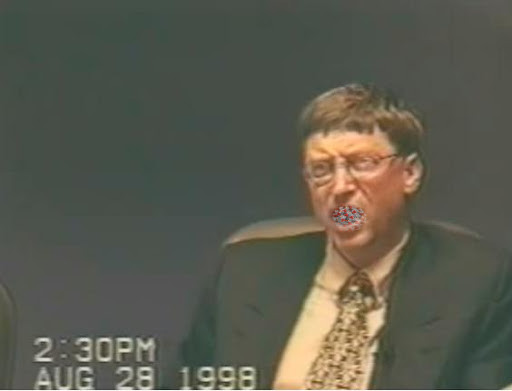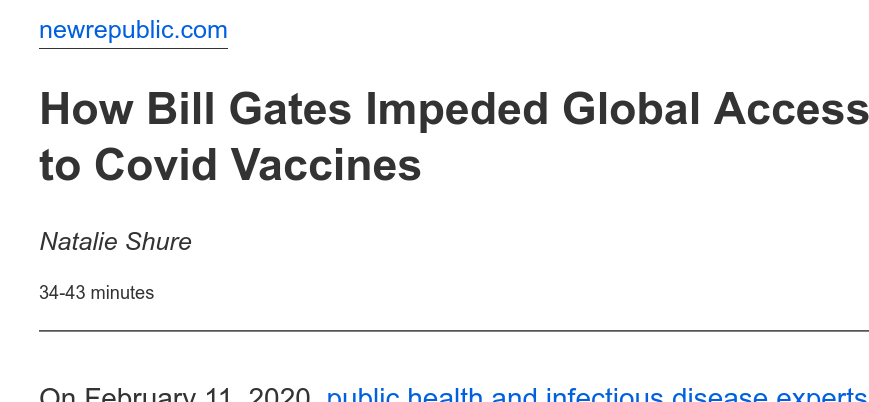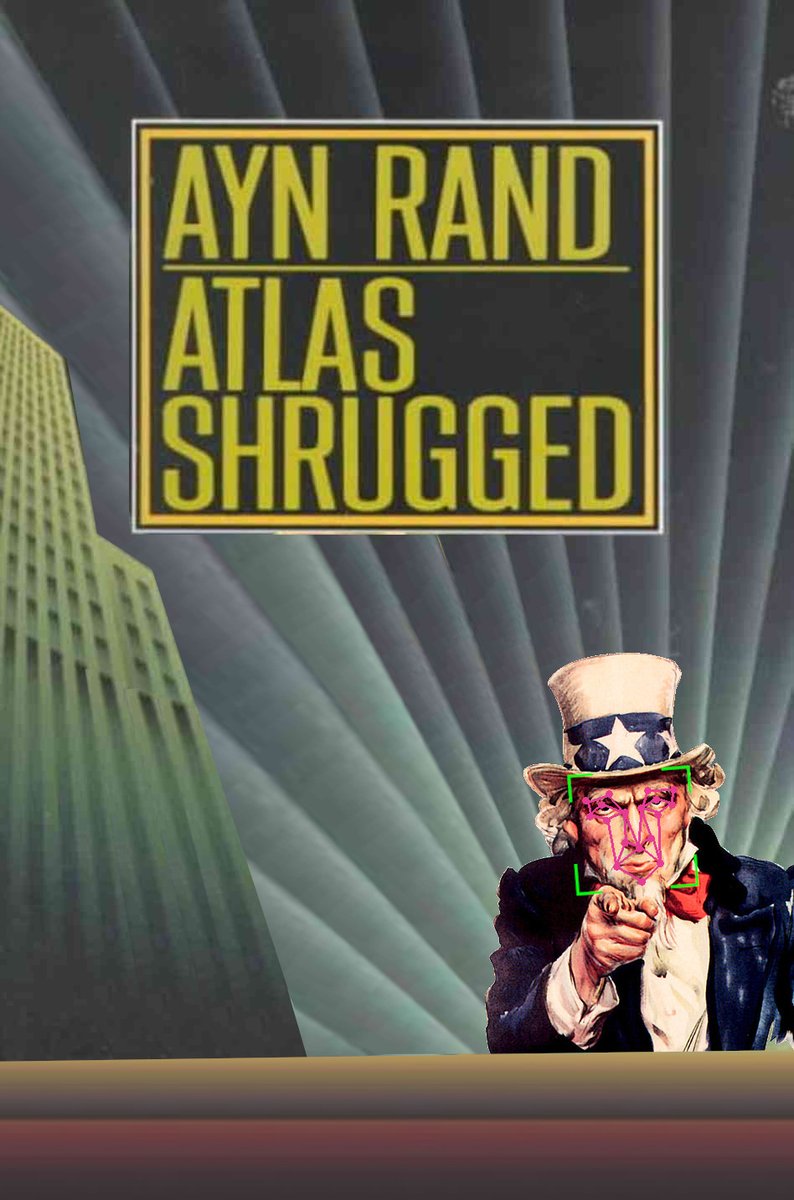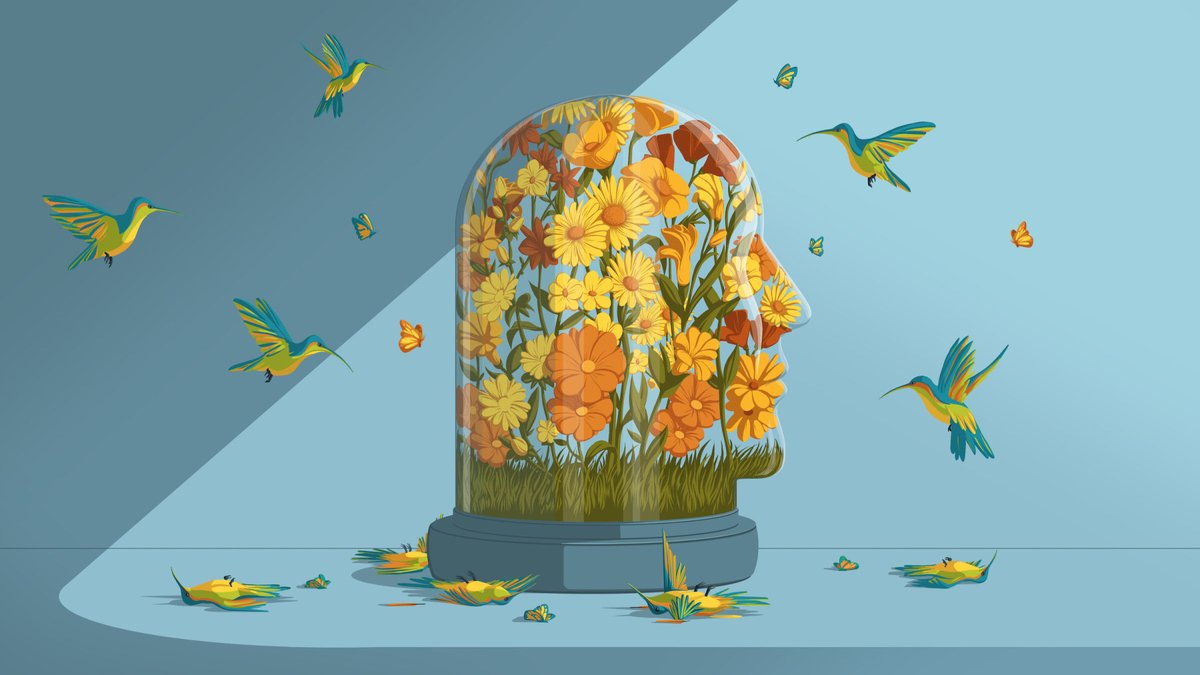
2.5b people in Earth's 130 poorest countries have not been vaccinated. The 85 poorest countries won't be vaccinated until 2023. The humanitarian cost is unforgivable - and self-defeating, as each infected person is a potential source of new strains.
who.int/director-gener…
1/
who.int/director-gener…
1/

How the actual fuck did this happen?
What happened to the early pledges by governments, the WHO, public health experts and leading research institutions to create global cooperation in vaccine development, eschewing patents and secrecy so that we could rescue our species?
2/
What happened to the early pledges by governments, the WHO, public health experts and leading research institutions to create global cooperation in vaccine development, eschewing patents and secrecy so that we could rescue our species?
2/
That dream was smashed.
Many people helped create our #VaccineApartheid, the single individual who did the most to get us here is Bill Gates, through his highly ideological "philanthropic" foundation, which exists to push his pitiless doctrine of unfettered monopoly.
3/
Many people helped create our #VaccineApartheid, the single individual who did the most to get us here is Bill Gates, through his highly ideological "philanthropic" foundation, which exists to push his pitiless doctrine of unfettered monopoly.
3/
It was Gates who sabotaged the WHO Covid-19 Technology Access Pool (C-TAP), replacing it with his failed ACT-Accelerator, a system of patents and secrecy and vast profits for the pharma industry, ornamented with nonbinding, failed promises of access for poor nations.
4/
4/
It was Gates who convinced Oxford to renege on its promise of patent-free access to its publicly funded vaccine research for the global south in favor of exclusive patent access for Astrazeneca.
khn.org/news/rather-th…
5/
khn.org/news/rather-th…
5/
When we hear ghoul sellouts like Howard Dean pushing the racist, genocidal lie that "patents don't matter" because brown people in poor countries can't make vaccines, we're hearing Gates's talking points:
pluralistic.net/2021/04/08/how…
6/
pluralistic.net/2021/04/08/how…
6/
Gates's role in vaccine apartheid is laid out in exquisite detail in @nataliesurely's outstanding @newrepublic feature, which delves into Gates's longstanding project to sideline democratic governments and cooperation in favor of monopoly tyranny.
newrepublic.com/article/162000…
7/
newrepublic.com/article/162000…
7/
This goes way, way back. I mean, WAAAY back, all the way to 1976, when Gates wrote his infamous "Open Letter to Hobbyists," decrying the dominant, cooperative mode of software development and calling its practitioners thieves.
en.wikipedia.org/wiki/Open_Lett…
8/
en.wikipedia.org/wiki/Open_Lett…
8/

Gates's fortune depended on creating a software monopoly, and that monopoly required "intellectual property" protection. Gates has always been a monopolist, and so naturally, he loves IP (before "IP" was a common term, copyrights and patents were called "monopolies").
9/
9/
Intellectual property is a very important part of the inequality story, the story of how we got to a world where billions of people are denied vaccines and where all people face new, more virulent strains as a result.
10/
10/
As @UNCTAD chief economist Richard Kozul-Wright told Lynn Fries for GPE: "[IP allows companies] to grab a larger share of what has already been produced in the economy."
It's a means of extracting rents, not for doing things, but for OWNING things.
11/
It's a means of extracting rents, not for doing things, but for OWNING things.
11/
IP is key to tax avoidance: companies like Ikea transfer "IP" (the Ikea trademark) to a numbered company in a tax haven; each national Ikea subsidiary pays "licensing fees" for the trademark equal to 100% of their in-country profits, so they never earn a (taxable) cent.
12/
12/
The transformation of the world into a monopolized system of IP-heavy, rent-extracting, tax-dodging companies really kicked into gear after 1999, with the signing of the WTO agreement and its IP adjunct, the TRIPPS, and as Shure details, Gates was instrumental there.
13/
13/
For this part of the story, Shure talks to @jamie_love, who was at the UN when NGOs like his were pushing to create vaccine and other pharma pools for the global south, while pharma companies handed out pamphlets bearing the Gates Foundation logo, smearing the plan.
14/
14/
Though the US delegation struggled for credibility, the combination of the Gates Foundation, and former US trade officials fronting for the global pharma industry managed to sideline the project, which was being driven by the demand for equitable access to AIDS drugs.
15/
15/
With Gates's help, the WTO emerged as an IP enforcement powerhouse. Shure cites @DylanMohanGray: "it took Washington 40 years to threaten apartheid South Africa with sanctions and less than four to threaten the post-apartheid Mandela government over AIDS drugs."
16/
16/
Incredibly, the Gates Foundation used this to burnish its humanitarian image: they solicited donations from pharma companies and used them to subsidize AIDS drugs in the global south, a maneuver that let them seem like philanthropists.
17/
17/
When in reality, they had overseen a program to systematically deny the world's poorest and most threatened people the right to make their own drugs, making them dependent on the whims of multinational corporate charity instead.
18/
18/
Sound familiar? Today, Gates runs around repeating the lie that poor people can't make their own medicine, saying that patent exemptions won't make a difference now - to the extent he's right, the world NOW is the crucial one.
19/
19/
Having sabotaged the efforts by poor countries to engage in the kind of production ramp-up the rich world saw as vaccines were being developed, it may NOW be too late. "Because of my bad ideas THEN, it's too late NOW."
20/
20/
The connection between IP and elite philanthropy is deep and important. IP's rent-seeking and tax-dodging has made poor countries beholden to offshore monopolists in health, agriculture and IT, and then starved them of taxes to build up domestic alternatives.
21/
21/
This, in turn, makes them dependent on "gifts" from the billionaires who arm-twisted them into IP treaties, forced them to pay rent on all domestic production, and then profit-shifted the funds out of the reach of their tax-collectors.
22/
22/
As @AnandWrites reminded us in his seminal "Winners Take All," the core purpose of elite philanthropy has been the same since the robber-baron era: to burnish the reputations of monsters who take everything and give back crumbs.
memex.craphound.com/2018/11/10/win…
23/
memex.craphound.com/2018/11/10/win…
23/
Reading Jamie Love's quotes in Shure's article reminded me of my own time working with Jamie and @KEI_DC at WIPO in Geneva, when I was an NGO delegate to a global DRM treaty.
24/
24/
You see, at WIPO, the vast majority of NGOs aren't human rights organizations or other public interest groups - they're industry associations representing tech, entertainment, broadcast and pharma monopolists.
25/
25/
These guys - almost all guys - were just aghast when real NGOs started showing up for these meetings and were absolutely shameless in their sabotage of our efforts to balance their corporate lies (absolutely bald-faced lies were routinely entered into the debates).
26/
26/
How petty? Well, they had been accustomed to writing up "fact-sheets" for the day's debate and handing them off to WIPO staffers working for the secretariat, who would photocopy them and set them out on literature tables for the national delegates.
27/
27/
So we started doing this too: we'd take careful notes on the day's debates, convene with global experts to debunk industry association lies, get our Indymedia friends to translate them into six languages, and hand them off to the secretariat in the morning for copying.
28/
28/
So they got the secretariat - a former US textiles negotiator who made her bones helping create the conditions for slave labor in places like Bangladesh - to end the practice of photocopying papers for all NGOs.
29/
29/
Of course the industry bodies had cushy offices in Geneva, whereas we stayed in flophouses and youth hostels. They could ask their underlings to come in early and do their copying for them, whereas we had to take a bus to the all-night copy-shop to get our handouts copied.
30/
30/
Here's where it gets super-weird: our handouts started to go missing. We'd set out our stacks of paper on the literature tables before the morning session and an hour later, they'd all be gone, but none of the delegates had managed to get a copy.
31/
31/
We found those missing handouts...in the garbage, behind potted plants and in the TOILETS.
No, seriously.
And here's the kicker: during the ensuing furore, the main response from the pharma lobbyists was to object to us calling ourselves "public interest NGOs."
32/
No, seriously.
And here's the kicker: during the ensuing furore, the main response from the pharma lobbyists was to object to us calling ourselves "public interest NGOs."
32/
I'll never forget this smarmy sociopath in his expensive suit, with his shit-eating grin, standing there saying, "Phamaceuticals serve the public interest, and our industry association is a nonprofit. We are a non-profit, public-interest NGO."
33/
33/
It was a remarkable sight. 20 years later, their version of the public interest - the doctrine of Gates - has produced a multi-billion-person reservoir of the sick and vulnerable who are doomed to serve as factories for highly virulent variants.
34/
34/
This is a literally genocidal doctrine, and it threatens our very civilization. It's a funny kind of non-profit, public interest move for an industry and its billionaire ideologue funders to have made.
But hey, at least no one's "intellectual property" took a hit.
eof/
But hey, at least no one's "intellectual property" took a hit.
eof/
CORRECTION! The author of the New Republic piece is Alexander Zaitchik, not Natalie Shure. For some reason, her byline shows under it in Firefox's "Reader" mode. My apologies to Mr Zaitchik. 

ETA - If you'd like an unrolled version of this thread to read or share, here's a link to it on pluralistic.net, my surveillance-free, ad-free, tracker-free blog:
pluralistic.net/2021/04/13/pub…
pluralistic.net/2021/04/13/pub…
• • •
Missing some Tweet in this thread? You can try to
force a refresh







